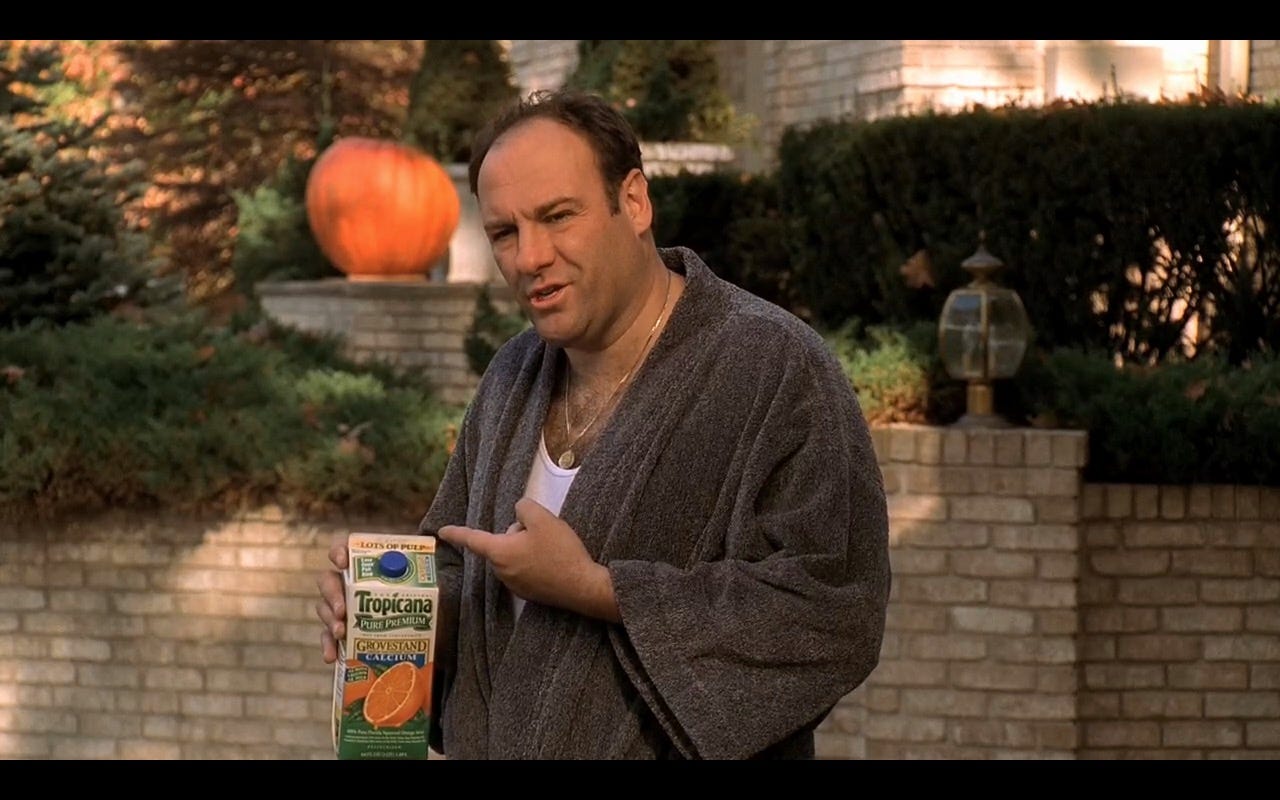
I’ve always loved “Second Opinion,” but I’ve sort of treated it as a post-“University” palate cleanser; I like to burn through episodes four through seven of this season all at once in a misguided effort to compress my angst into a single sitting. Absorbing this installment as its own discrete thing made me realize it might be my favorite episode of the series — or at least one of the best examples of the things I love most about it.
At a glance, it’s a fairly straightforward thematic-exploration episode. You could not set up a more explicit cross-examination of Carmela Soprano’s sense of herself and her life. Her marriage makes her complicit in her husband’s labor, and a series of escalating incidents forces her to grapple with this fact — including two therapy sessions for which, I am required by law to note, she gets all skirt-suited up. But she ultimately leverages what she learns through those come-to-Jesus moments to try to buy mainstream respectability rather than make changes that would actually restore her inner sense of dignity. Her choice to finesse rather than uproot her life is not unlike Christopher’s tragic recommitment to Tony last season — and, like Christopher’s near-death experience, it’s even darker when you watch knowing neither will ever fully extricate themselves from this.
But there’s so much lurking beneath the surface of this deceptively simple narrative, so much that’s depicted in painstaking detail but never directly unpacked in dialogue. Such as Carm’s tendency to treat men as escape hatches, which gets shaded in with more complexity here. If her parents’ Sunday dinner lamentation about Angelo Stamfa is any indication, the notion that the trajectory of her life would be shaped by her male partner has been instilled in Carmela from a young age. (As an aside, I could write a whole issue analyzing when the Sopranos use which dining table and which place settings.) Yet she’s not wholly without agency in this formulation. Men might shape her circumstances, but she chooses men who, like the dean, give her access to the circumstances she’s figured out she wants: men who are more *~*cultured*~* than Tony, men who validate her unrealized intellectual and creative potential.
And yet she keeps choosing Tony every day. It would be one thing if Carmela were oblivious to the fact that her life could have gone in other directions, but she dips into other possible lives and always returns to the one she has — and often the show suggests that she does this because it’s easier to stay comfortable, because the risk seems too high. But in “Second Opinion,” it feels like she recommits to her life because she thinks she deserves nothing better — she knows she’s complicit, and she believes she should suffer for her complicity.
Usually she puts far more effort into avoiding any direct examination of that fact, but all she can bring herself to do is point out all the ways she’s not alone in this. She reminds her parents how they’ve personally benefitted from Tony’s work. She calls Melfi out on imagining exculpatory details Tony never volunteered himself. (Again, their time together is an insane contrivance but so what, who cares, I love my two moms!) She steps right up to the line of reminding Meadow how the college education she uses as a conversational weapon gets paid for; the only reason she doesn’t have to say it outright is that Meadow knows that well enough to pull back first.
But for all that acknowledgment of complicity, everyone shies away from naming what, exactly, they’re complicit in, from detailing the specific things they feel ashamed about. Pussy’s death hovers at the edges, his spectral presence revived by a random infomercial purchase and a chance supermarket encounter. Tony clings desperately to his belief that Carm has no idea that Pussy was murdered; so much of his sense of self-worth depends on his perception of how the women in his life perceive him. He tries to persuade her that Pussy is the real dirtbag for entering WITSEC without bringing his family with him, then harasses Angie to scare her out of saying anything that might help his wife piece the true story together. But Carm already knows, of course, and when she reveals that fact — a passing reference to “Angie Bonpensiero and who knows what other widows on your payroll” in the middle of a larger argument — he doesn’t even blink.
They both know exactly who he is. Their marriage depends on it — not, as a less complex narrative of this type of bond would have us believe, her not-knowing. Most of us, I imagine, don’t know any mob wives. But we all know women whose husbands we can’t wrap our heads around — women who seem simultaneously too smart not to understand what they’ve signed up for and too upstanding to have willingly signed up for it. (And, in the logical inversion of that equation, we all know men who deploy the women in their life as evidence that they can’t possibly be that bad.) I tend to cling to the idea that these women believe they can rehabilitate these men — partially because this has been a delusion I’ve harbored in all kinds of personal relationships, but mostly because it’s too depressing to consider the alternative: they’ve examined their options and they believe this is the one that suits them, the punishment they’ve earned.

